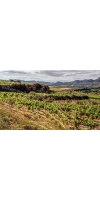Wine from Creaciones Exeo

At Exeo we want drinking one of our wines to transport you to the place where they come from, their landscapes, their people and, above all, their vineyards. That is why we put all our efforts into preserving the quality of our raw material, the vineyard, and its fruit as much as possible.
At Exeo we harvest all our plots by hand and collect the fruit in small boxes, respecting the integrity of the grapes so that they are able to transmit their character to the wine, to the glass.
It is a family winery, located in the urban center of Labastida, an initiative of Fidel Fernández Gibaja, who is followed by his sons Carlos, Fidel and his grandson Guillermo. The winery is part of the heritage of a dynasty of winegrowers with 24 hectares of its own vineyards, some of which are over a hundred years old.
The brothers put all their passion and knowledge into making wines, without forgetting the roots of Rioja Alavesa.
The vineyard is worked logically, respecting as much as possible the structures of the soils of its region and the identity that each grape variety acquires in each plot. They fight for clean cultivation without pesticides, seeking the greatest openness, intensity and purity of Rioja Alavesa, to which they add their constant interest in reinventing themselves. All of this results in the production of world-renowned wines, trying to convey their vineyards, their soils and their house in each bottle of wine they produce.
All of its vineyards are located in Labastida, Rioja Alavesa, sheltered by the Sierra Toloño. These have belonged to them for three generations and another part have been acquired under their criteria and always valuing their soils and orientations.
Respect for maintaining and recovering the small, large payments of Rioja Alavesa. Respect for maintaining the wines that this land offers us, so we work in concrete, both in tanks and in eggs.
No products found
- back
Selected Options
Wineries
Categories
Pricing
Countries
Regions
Grape Types
Wineries
Organic/Free Shipping
Alejandro Bulgheroni Lithology Cabernet Sauvignon is made from 100 percent Cabernet Sauvignon.
We only produced a scant 50 cases of this wine this year, far too small an amount considering how great it turned out. There’s that typical saturated to the rim deep purple color, with intense cassis, herb, and milk chocolate, bricks and forest floor, black plum pudding aromas. In the mouth, there’s a great balance, with notable oak and vanilla notes intertwined with dense black fruits. It’s an opulent and plush style, yet finishes with sweet grippy tannins.
Philippe Milan Pommard AOC is 100% Pinot Noir.
This wine has been aged in Oak (25% new Oak).
This is a little more structured and the style goes more toward the
"vin de garde", or wines meant to age. This wine needs some food, or sometime
in the decanter right now. It is well structured and reminds me of a Volnay. As
a matter of fact, the parcel is located right next to Volnay. The finish is
long and still quite juicy with chewy tannins lingering.




